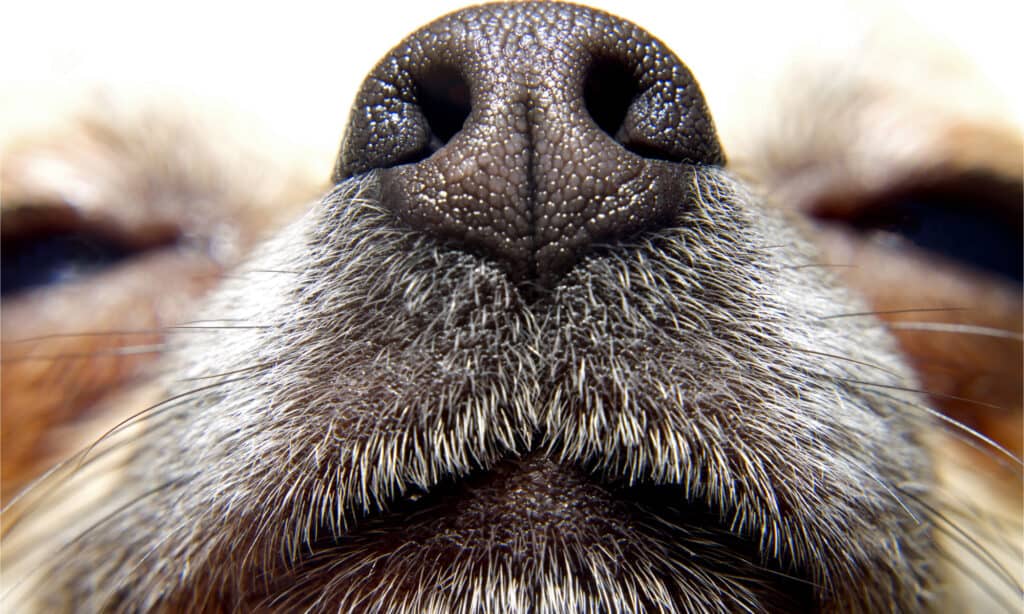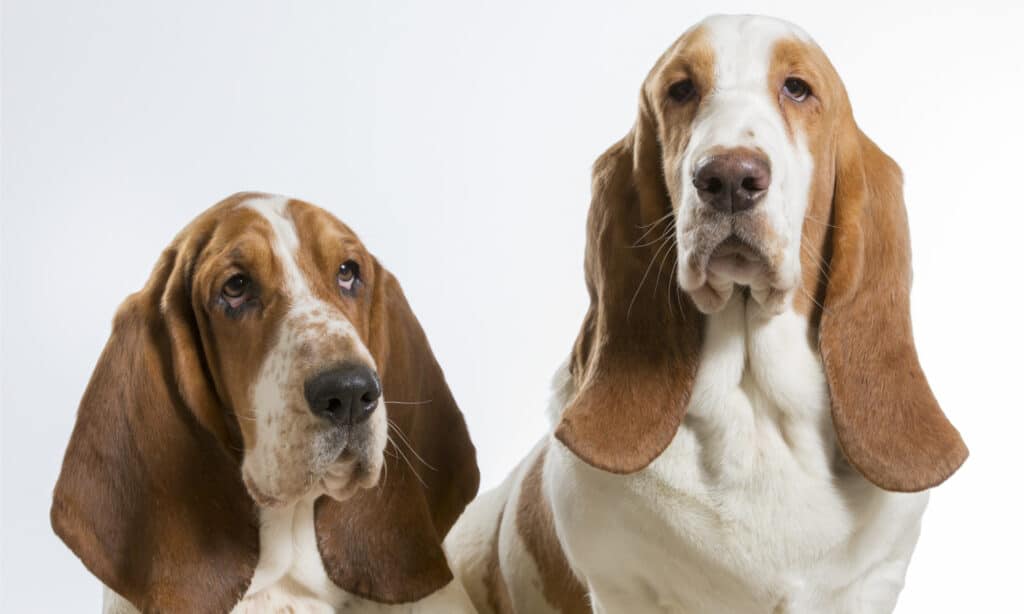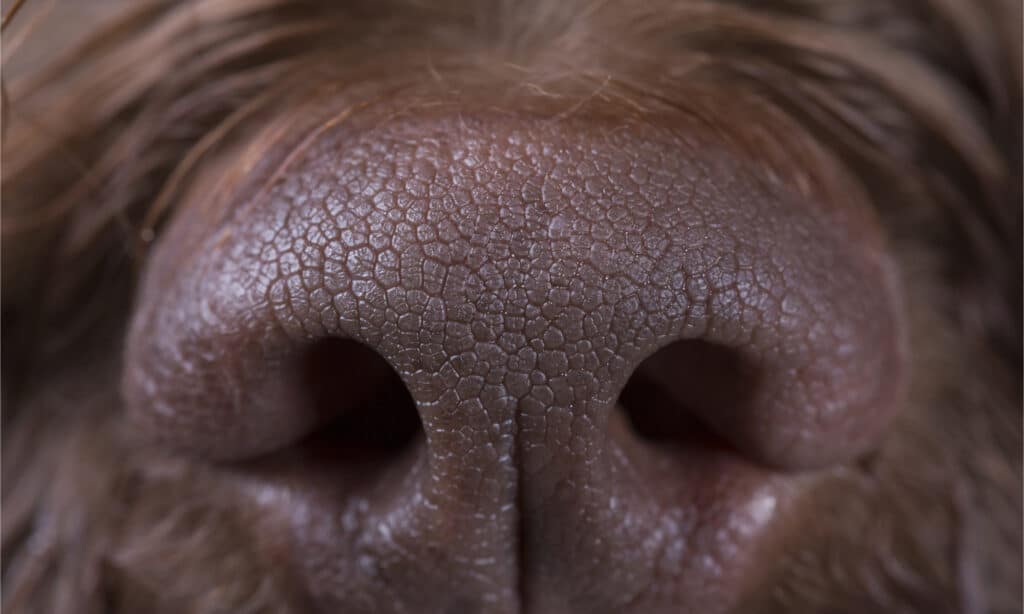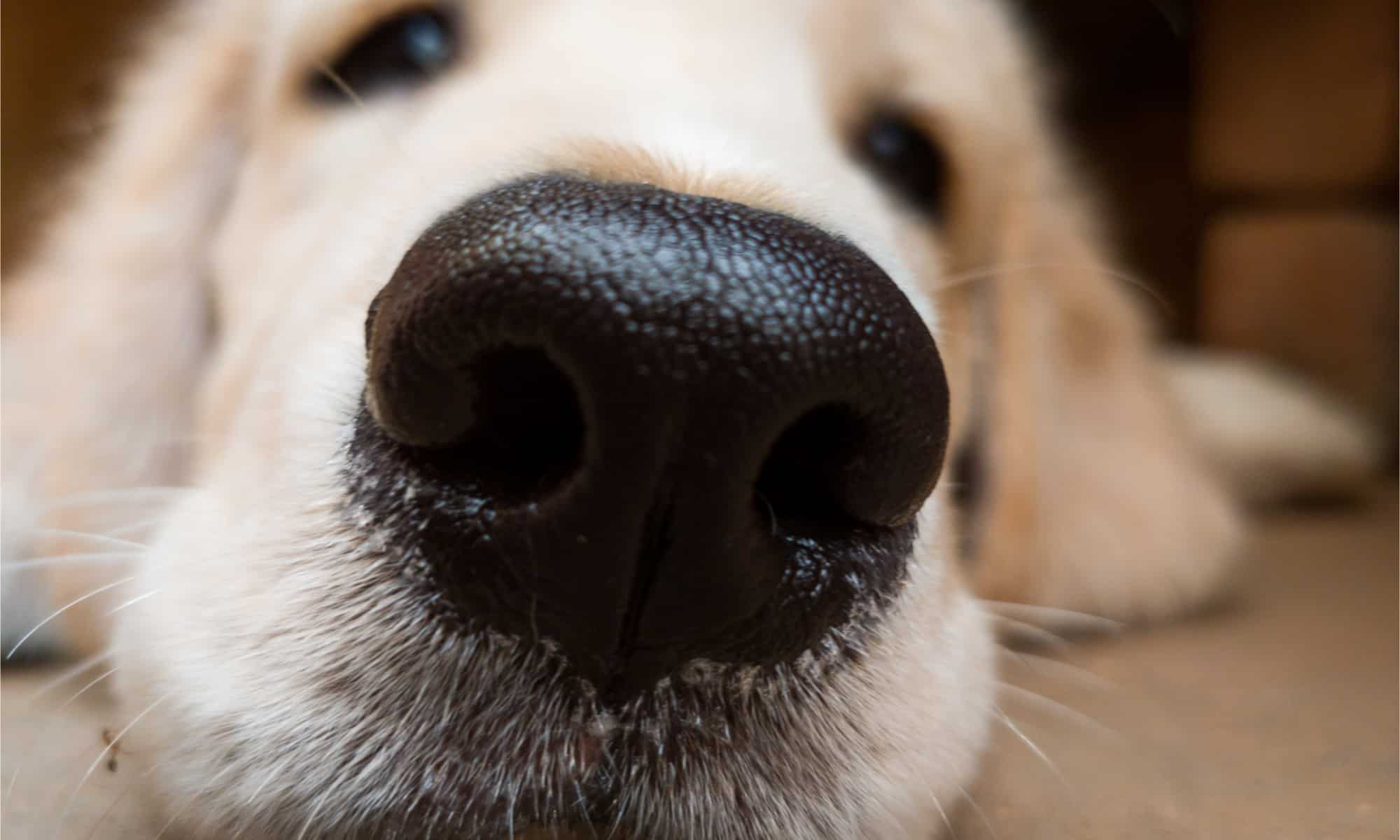There is a common misconception amongst dog owners that you can tell how healthy your dog is by examining their nose. Whilst it is true that dog noses can show signs of illness, there are no hard and fast rules about what they should look and feel like in a healthy dog. Instead, you should make a mental note of what is normal for your pooch. Then, you will be able to notice when something is wrong. So, why are dog’s noses wet and should they be wet all the time? When should you be worried? Let’s look at what the experts have to say.
What Is Normal for a Dog’s Nose?
The traditional view is that a healthy dog will have a cold and wet nose. This is true for dogs that are awake and moving around. However, it is not unusual for sleeping dogs to have warm and dry noses.
Also, every dog is different. Some always have a slightly drier and warmer nose even when they are perfectly happy and healthy. There are no hard and fast rules when it comes to dogs’ noses. You do, however, need to know your own dog.
Finally, humidity levels can influence how wet your dog’s nose is. You can expect your dog’s nose to be dry in arid conditions when there is not much moisture in the air.

The notion that dogs’ noses should be cool and wet isn’t a hard and fast rule.
©bimka/Shutterstock.com
Why Are Dog’s Noses Wet?
So, where did all this fuss about dogs having wet noses come from? It arises because having a wet nose has some important advantages for a dog.
Wet Noses Are Better at Sniffing
Let’s start by looking at the main function of a dog’s nose – sniffing. Sense of smell is very important to a dog. They get much more information about their environment from how it smells than from how it looks or sounds. This is because dogs have very sensitive noses. They have over 100 million sensory receptors compared to just 6 million in humans. Dogs also have a special organ called the Jacobsen’s Organ that can detect chemical messages emitted by other dogs. Added to this, the part of their brain that receives and interprets information on chemical messages and scents is forty times larger than the comparable area in the human brain.
It’s clear that ancient dogs who lived in the wild needed a good sense of smell to survive. This means that anything that made their sense of smell more acute, gave them a better chance of survival. The bottom line is that wet noses work better. Scent particles stick to them better and are therefore more likely to be detected by the dog.

Basset hounds sensitive noses work more efficiently when they’re wet.
©Jne Valokuvaus/Shutterstock.com
Wet Noses Protect From Infection
The moisture around your dog’s nose keeps the delicate cells protected. It also helps to moisten the air before it enters your dog’s respiratory system. This keeps the tubes leading to the lungs (trachea and bronchi) healthy and able to resist bacteria and viruses that can cause chest infections. This means that a wet nose is highly beneficial when it comes to defense against germs.
Wet Noses Help Dogs Cool Down
Dogs have a cooling mechanism that is completely different from that of humans. They do not sweat in the same way as we do and rely on panting instead. However, their nose is one of the few areas of their body that does produce sweat. As it evaporates, it uses up energy from the surface of the nose and cools down the blood circulating in this area.
So, dogs with wet noses are better at cooling themselves down.

Dogs’ noses are one of the few areas of their bodies that produces sweat.
©Jne Valokuvaus/Shutterstock.com
How Do Dog’s Noses Get Wet?
Now we know that having a wet nose has several advantages for a dog, but where does the moisture come from? There are three sources that we need to think about.
Nasal Mucus
The lining inside your dog’s nose is made up of special cells that are able to produce a thick fluid called nasal mucus. This sounds a bit disgusting but it plays an important role in keeping your dog’s nose and respiratory system working properly. Some of this mucus ends up on the nose pad.
Nose Sweat
Your dog’s nose pad contains merocrine sweat glands which function in a similar way to human sweat glands. They are only able to produce a small amount of sweat. Nevertheless, as it evaporates it will help to cool your dog down.
Often, a dog with a wet nose is simply sweating – it has nothing to do with how healthy they are!
Saliva
Dog’s noses also get wet because they lick them. Dogs have very long tongues, so even the dogs with long noses can do it. However, not all dogs bother to do it that often!
Dogs lick their noses for a few reasons. The main purpose is to keep their nose clean. They often get bits of food on it after they have eaten and it needs a quick lick to remove the food particles. Also, dogs that do a lot of sniffing spend a lot of time with their nose close to the ground. Their nose picks up particles of dust and pollen that they need to remove with their tongue. It also plays a role in how they ‘smell’ things with their Jacobsen’s organ. This is located between the nose and mouth and has receptors in both. When chemical messages have become trapped in the mucus on the nose pad, they can be swiped off by the tongue and carried to the Jacobsen’s organ in the roof of the mouth.
Moisture From the Environment
When they are sniffing around their environment, dogs thrust their noses into damp areas and some moisture ends up on their nose. Typically, this would be damp piles of grass or leaves, shrubs, bushes and even puddles and streams.
Can a Dog’s Nose Be Too Wet?
Is it possible to have too much of a good thing when it comes to wet noses? Yes it is, and you should be alert for your dog’s nose being too wet. Here are some of the conditions that can cause it.
Respiratory Infections
Upper respiratory tract infections are the main cause and sadly these are quite common in dogs. Bacteria or viruses invade the cells lining the nose and airways leading to the lungs. The cells respond by producing more mucus than normal. The Brachycephalic breeds, like Pugs and French Bulldogs get upper respiratory tract infections most often because of the unusual shape of their nasal passages. Often, the mucus will be green or tinged with blood and may leave a crusty layer around the outside of the nose. Your dog may need antibiotics to clear up this infection so take them to a vet.
Allergies
Allergies can cause dog’s noses to become irritated and in response, it produces too much mucus. Then, your dog licks their nose excessively because it is uncomfortable and this irritates it even more so that more mucus is produced. You may also see your dog scratching their nose and it may look sore and inflamed.
There are lots of allergens in the environment and in food that can cause this reaction. You will need your vet’s help to get to the bottom of what is causing the problem. If food is the issue, you may need to swap to a special food for dogs with allergies. Dogs can also take allergy medication prescribed by a vet.
Nervous Issues and Anxiety
Some conditions can make a dog lick their nose excessively making it too wet and inflamed. There are types of seizures and nervous conditions that make a dog’s brain think that their nose is constantly itchy. A lot of damage can be caused to the delicate skin of the nose and medication from your vet is usually required to control it.
Can a Dog’s Nose Be Too Dry?
A dry nose is not always a sign that your dog is sick. However, if your dog’s nose is drier than normal or if the dryness cannot be explained by them sleeping or by the lack of moisture in the air, it may mean that something is wrong.
So, despite the natural variation in dog nose moisture levels, there may be occasions when you notice that your dog’s nose is too dry. Here’s a list of potential causes.
Sunburn
Most of your dog’s body is covered with a thick coat of fur so sunburn is not a major concern for them. Their delicate noses, however, are completely exposed to the UV and infrared light from the sun. Dogs can get sunburn on their noses which causes dryness, redness and cracking. This needs to be treated by a vet to prevent over-licking of the area and infection.
You can buy special sunscreen for dogs that will protect your dog’s sensitive nose from sun damage.
Dehydration
Dehydration is a serious condition and can cause a dry nose. This can be related to the heat and could also be a sign of heatstroke. You may also notice that your dog has sunken eyes and that their gums are pale. They will appear generally weak. It is important that you see your vet as they may need IV fluids.
Dogs should not be allowed to run around in very hot temperatures as they cannot cool down fast enough afterwards. On hot days, keep your dog inside and encourage them to lie on a cooling mat.
Skin Conditions
Dog skin conditions have multiple potential causes. These include parasites and autoimmune diseases. They all need to be investigated and treated by your vet.
Brachycephalic Breeds
These dogs are the most likely to have dry noses and this can cause them a few problems. Their tongues are shorter than most other dogs and they cannot lick their noses. Never use human moisturizers as this will cause irritation. Instead, you could try some nose balm designed specifically for dogs.
Ready to discover the top 10 cutest dog breeds in the entire world?
How about the fastest dogs, the largest dogs and those that are -- quite frankly -- just the kindest dogs on the planet? Each day, AZ Animals sends out lists just like this to our thousands of email subscribers. And the best part? It's FREE. Join today by entering your email below.
Thank you for reading! Have some feedback for us? Contact the AZ Animals editorial team.








